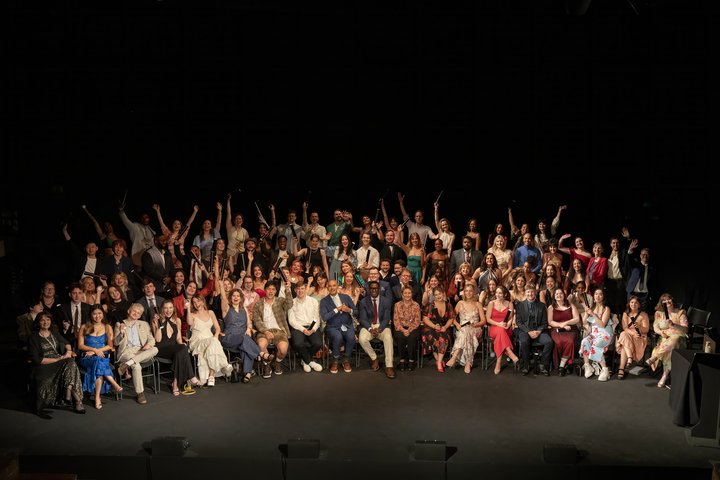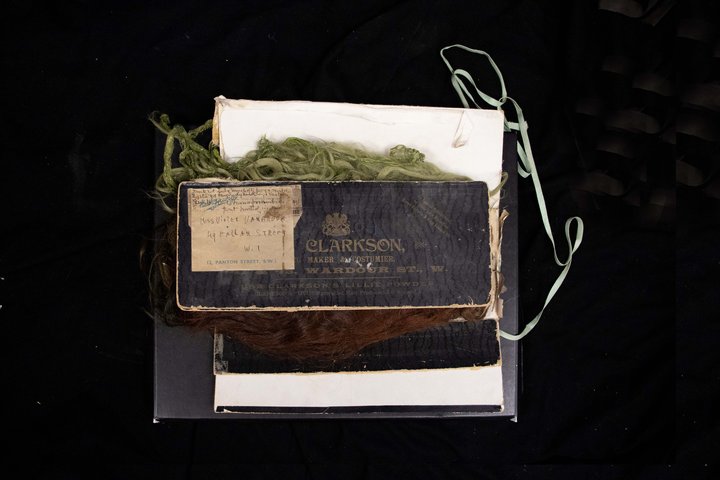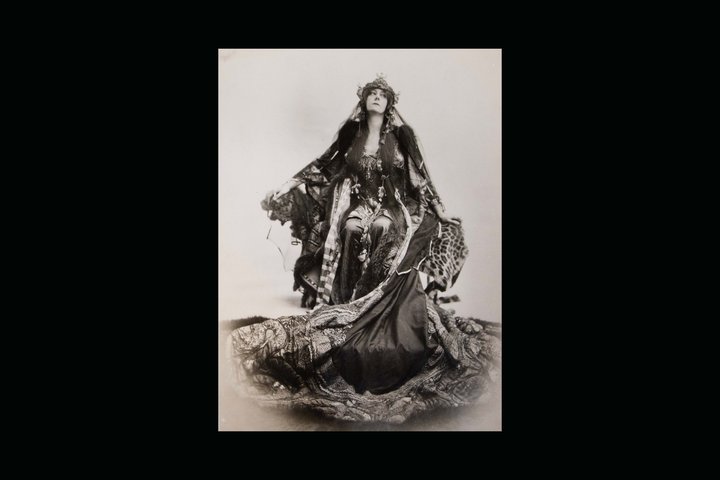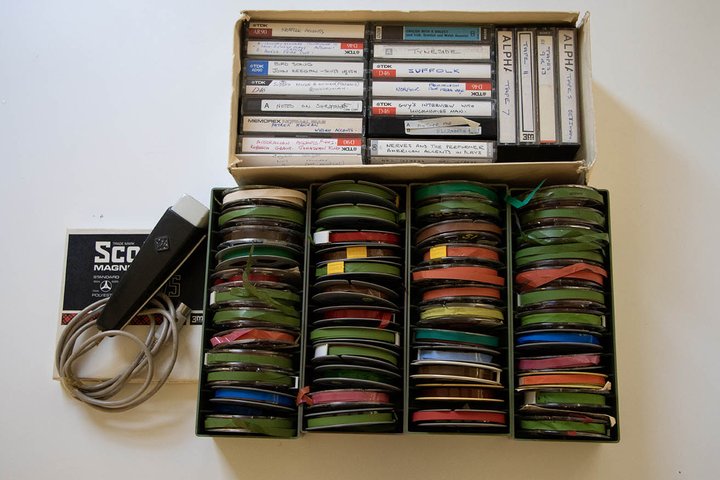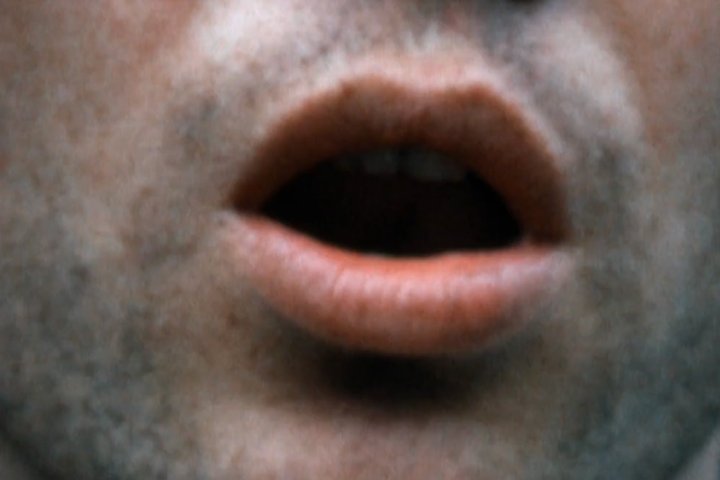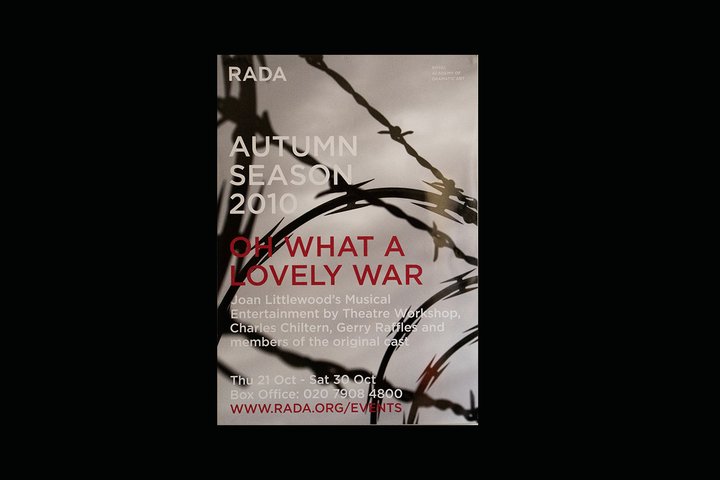RADA through the archive
by Lolita Chakrabarti OBE
Founded in 1904 by actor-manager Sir Herbert Beerbohm Tree at His Majesty’s Theatre in Haymarket, London, RADA boasts an incomparable roster of artistic and technical graduates who have changed the world with their work. All artists, past, present and future, will be judged through the progressive lenses of future generations. Some will endure, some will not. But every interaction has been an essential part of the Academy’s story. RADA is 120 years old. This is a snapshot of this unique institution through a selection of objects from the Academy’s eclectic archive that help to tell the story of each decade until now.
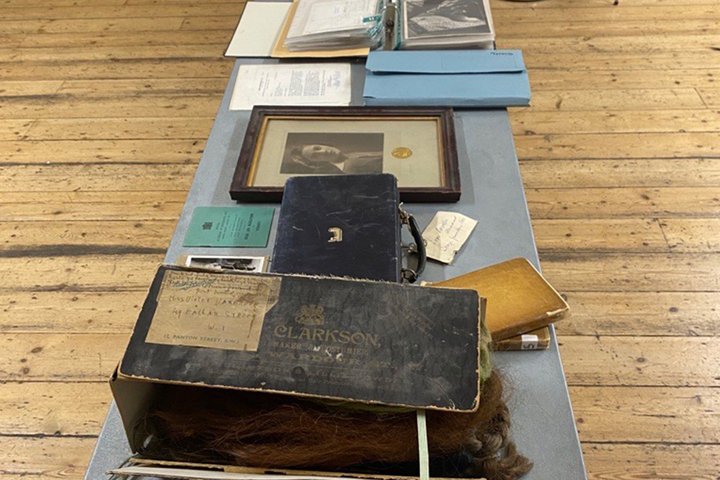
Sarah Bernhardt, actress and icon, was born in 1844 to a Dutch-Jewish courtesan with a wealthy clientele. When she was a teenager, her mother’s lover, the Duc de Morny, (half-brother of Napoleon III), secured her a spot in France’s prestigious National Theatre company, the Comedie-Francaise. She debuted in the title role of Racine’s Iphigénie. She was not a hit. After the curtain call, her teacher remarked, “I can forgive you, and you’ll eventually forgive yourself, but Racine in his grave never will.”
Over the course of her subsequently stellar career, Bernhardt played countless roles on the stage, both female and male. She toured the world and starred in several silent films. Always cutting edge, she was a socially minded individual who stood up for what she believed. When she died in 1923, thousands of people lined the streets of Paris as her coffin made its way to Pere Lachaise cemetery.
Bernhardt filled an autograph book presenting it ‘to Mrs Keeley for the Benefit of the Actors Orphanage June 1896’. It was posthumously gifted to the Academy. It is a weighty, leatherbound opus with a metal binder, the inside of the cover is lined with green silk. In it are hundreds of signed photographs of the luminaries of the day – Queen Victoria with her seal in black wax, Charles Dickens with his right hand slid into the lapel of his jacket looking straight at the camera, Forbes Robertson with beads around his neck in a Shakespearean pose, Ellen Terry leaning against a pillar with theatrical ennui, Herbert Beerbohm Tree, Henry Irving and so many more. It is an exceptional theatrical prologue of the world before RADA. It shows us the world that was.
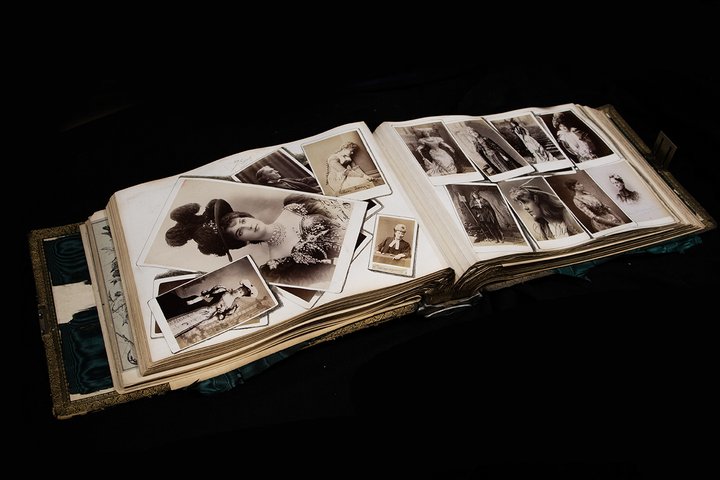
In the very first prospectus the list of artists who had ‘kindly consented to be visitors to the Academy’ included J.M Barrie, Dion Boucicault, WS Gilbert, Henry Irving, Arthur Wing Pinero, Ellen Terry, Lady Bancroft among others. This statement in the prospectus shows that hopes for the Academy were high -
“… to give proper and adequate instruction and training for the stage in this country. In other countries such training schools have been regarded as an absolute necessity, and for many years past the establishment of such an Institution in England has been discussed…Mr. Tree, therefore, in the Spring of 1904 founded The Academy of Dramatic Art, with the hope that, if success attends it, it may become in time one of the National Institutions of Great Britain.”
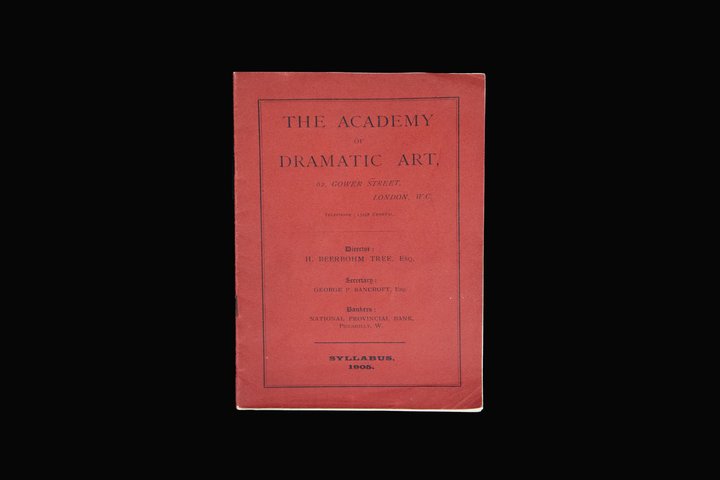
That same year actress Violet Vanbrugh, aged 47, gifted the wigs she had worn as Lady Macbeth to the Academy. As a young actress Violet toured America with Madge Kendal’s company, was cast by Henry Irving as Ann Boleyn in King Henry VIII, made silent films and aged 71, appeared in the Oscar-winning film of Pygmalion.
Her younger sister, Irene, was also a well-loved actress. She made her London debut on Lewis Carroll’s recommendation and her extensive career included the premier of Oscar Wilde’s The Importance of Being Earnest, as well as plays by J M Barrie, Sir Arthur Wing Pinero and Somerset Maugham.
Violet and Irene’s brother, Kenneth, would become director of the Academy in 1909 and rebuilt one of the Academy’s three theatres after it was bombed in the second world war. He named it the Vanbrugh Theatre in their honour when it was completed in 1954. Their names remain there today.
Sir Squire Bancroft was the first President of the Academy. He and his wife, Effie Bancroft, were actor-managers of The Prince of Wales Theatre in the London’s West End. They instigated a new form of drama known as 'cup and saucer drama'. The introduction of realism changed theatre forever - people talked in normal language, dealt with ordinary situations and the performers didn't declaim.
In June the Academy was granted its Royal Charter making it the Royal Academy of Dramatic Art. Royal Charters are awarded to bodies that work in the public interest that can demonstrate pre-eminence, stability and longevity in their particular field. The Charter elevated the Academy to have its own independent legal standing giving it a royal stamp of approval.
In 1927 RADA sent 30th birthday wishes to their new Patron Edward Prince of Wales and he sent this telegram of thanks back, signing it casually as Edward P.
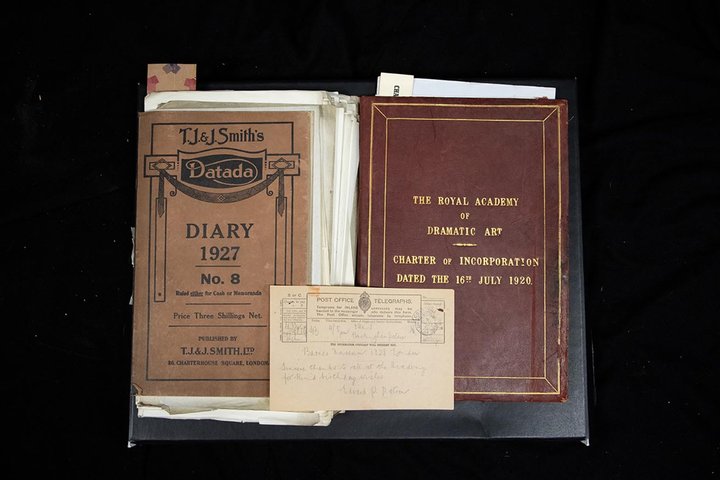
Edith Evans graduated as an actress from RADA in 1926. Over a career spanning sixty years, she played more than 100 roles on stage in the classics of Shakespeare, Congreve, Sheridan, Goldsmith and Wilde, the contemporary works of Bernard Shaw and Noel Coward, and appeared in many films where she was nominated for three Academy Awards. She was loved and admired for her work. Her performance as Lady Bracknell in the film of The Importance of Being Earnest in 1952 is still quoted today. She was made a DBE in 1946 and became President of RADA in 1964.
In 1938 Walter Sickert painted her portrait as Katharine in Shakespeare's The Taming of the Shrew. Sickert was born in Germany, initially training for a career on the stage. He toured with Sir Henry Irving's company but never progressed beyond small parts and abandoned acting to study at the Slade School. Now recognised as one of the most important artists of the 20th century, Sickert helped shape modern British art as we know it. With ties to renowned painters from Whistler to Degas, he still influences contemporary painters today. This portrait of Edith Evans (on loan from the Rayne Foundation) hangs proudly in the Principals Office at RADA where it has served to remind each Principal of the reason they are there.
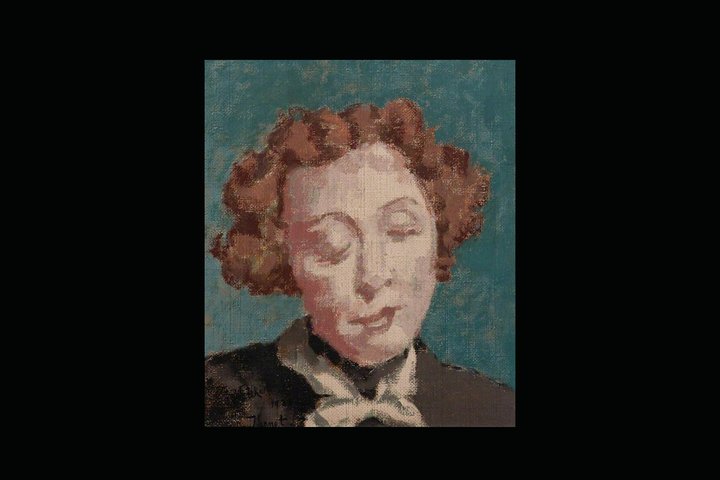
Children and expectant mothers were evacuated from London. The British Army was mobilized and blackouts were a regular occurrence. When Italy declared war on Britain, large mobs attack Italian businesses and their families in London and the rest of the country. Cardiff and Plymouth were bombed. Air raids began on all major cities. Petrol was rationed.
The government closed public places of entertainment, but it rapidly became clear that they were essential to national morale. The show must go on!
Stage costumes and make up were rationed, afternoon performances became common, air raids disrupted performances. Audience members were free to leave for a shelter if they wished but were asked to ‘depart quietly and without excitement’. Many theatregoers chose to stay.
After much debate and with a lifeline of substantial financial support from George Bernard Shaw, RADA stayed open. When the main theatre (now the Vanbrugh) was bombed the graduates helped clear the rubble. One of them was Richard Attenborough who 60 years later would be President of the Academy. This photograph shows where students hung up their gas masks during that time.
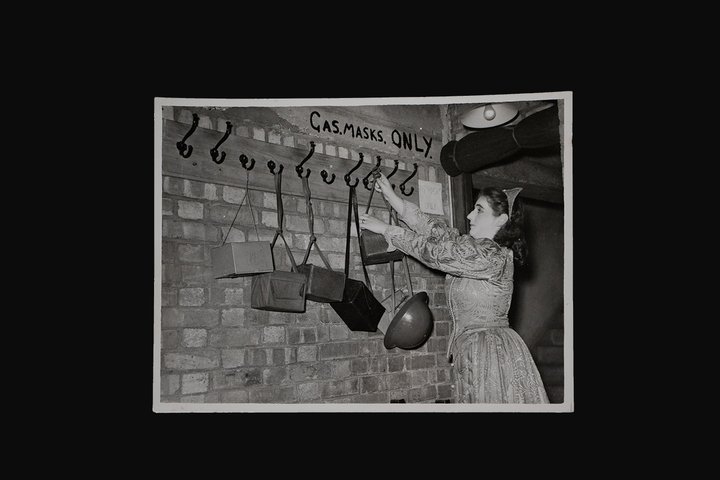
“The kind of people who always go on about whether a thing is in good taste invariably have very bad taste.” (Joe Orton)
Joe Orton was an Acting student in 1951 and wrote this letter to the Registrar when he was 18 years old, asking if he could delay the start of his training due to his forthcoming appendectomy operation. His handwriting is self-conscious and so young. Orton would become a highly influential playwright, author, and diarist. He was also gay at a time when homosexuality was still illegal in England. He was tragically murdered in 1967 by his partner Kenneth Halliwell, a fellow graduate. Orton's hallmark as a playwright in his short career was dark humour, surreal situations and attacks on hypocrisy. His subversive nature helped him to stand out from his peers.
Dudley Sutton, a fellow graduate, starred in Orton’s play Entertaining Mr Sloane in London and on Broadway. He later said -
" To fight the demon of homophobia with a West End comedy was brilliant - I'm very proud to have been a part of it."
Orton shocked, outraged, and amused audiences with his scandalous comedies. He was a trailblazer, an agitator and a total original.
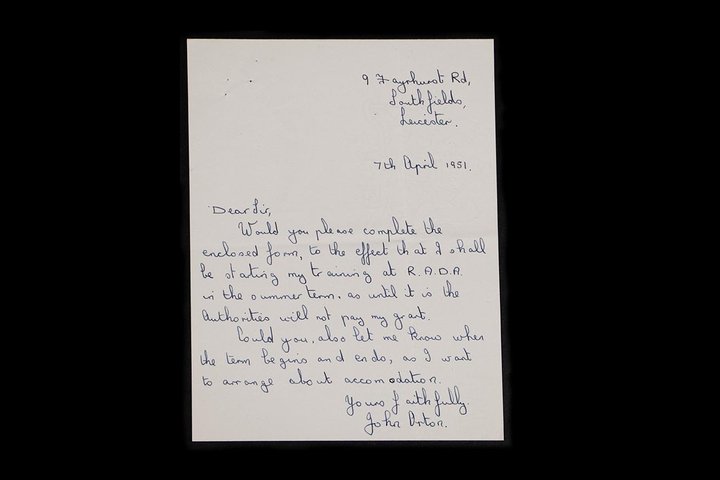
The year Orton became a student was the year that Ivor Novello died. Novello, a Welshman, was an iconic actor, dramatist and composer. In a remarkable career spanning some forty years he covered virtually every aspect of the entertainment business. Novello and his partner, the actor Robert Andrews, were together for 35 years until his death.
Noel Coward wrote of Novello -
"Theatre, good, bad and indifferent, is the love of his life. For him, other human endeavours are mere shadows. The reward of his work lies in the indisputable fact that whenever and wherever he appears the vast majority of the British public flock to see him”.
Novello left this box of stage jewellery to RADA. In it are pieces of theatrical history – broaches, rings, pendants, lockets and earrings. Although Novello was not a student at RADA his artistry and practise were an example to students. A scholarship of £4,000 was set up in his memory in 1956 (equivalent to £100,000 today). His accomplishments as a multi hyphenate are a legacy for current and future students.
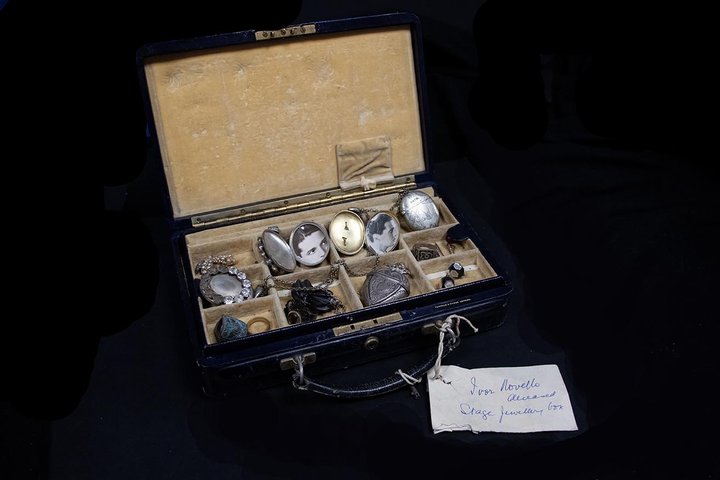
Mona Hammond graduated as an actress in 1964. She was born Mavis Chin in Tweedside, Jamaica, winning a scholarship to RADA. She became a fierce artist, an uncompromising trailblazer and an advocate for change. She co-founded Talawa Theatre Company in response to the lack of creative opportunities for Black actors in Britain. Talawa is now the primary Black theatre company in the UK, with more than 50 award-winning touring productions from African classics to Oscar Wilde behind it.
These extracts of her reports whilst at RADA are proof of her natural abilities with the classics. Students are still told that the training is the start of a lifelong learning and that it takes ten years out of RADA to become an actor. The second extract underlines this.
In 1994 Mona played the Fool in King Lear for Talawa Theatre Company. That production started at the Cochrane Theatre and toured England. She led a cast of several other young RADA graduates – David Harewood (currently President), Diane Parish and me, Lolita Chakrabarti.
In 2019 she was made an Honorary Fellow of the Academy. As an actor she worked extensively across stage and screen until her death in 2022.
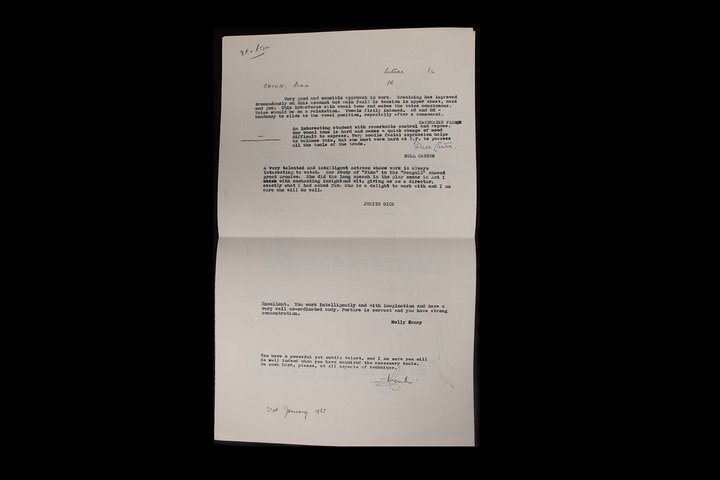
Elizabeth Pursey gained a place at RADA but her father's declining health, after sustaining serious injuries in the first world war, meant that she did not take up the offer. Instead, she worked as a teacher and then took a postgraduate course in voice studies. Elizabeth became an inspirational voice coach with a long teaching association with RADA.
During that time, she made ‘RADA Mouths’ on standard 8mm film which focused on the mouths of first year students. She then revisited those students at the end of their training to see how the tension around their mouths and their diction had altered. Although Acting is about instinct it is underpinned by technique and discipline, this exercise highlights that. Students mouths on this film include Imelda Staunton and Alan Rickman.
Elizabeth also worked on many significant films, including The Unbearable Lightness of Being with Daniel Day-Lewis, who so valued her work and insight that she was brought in to help other actors during the shoot. Over the years, a host of talent including Joss Ackland, Tim Pigott-Smith and Joan Plowright, sought her help.
In her semi-retirement, Elizabeth continued to work at RADA, giving precise advice to students. Alan Rickman remembered one such time:
"A group of second-year students had prepared pieces by Dylan Thomas. Elizabeth stood in front of them: upright, elegant and smiling…The students were busy writing down every timeless word she said. Finally, it was their turn. As the first volunteer walked to the front….she turned and, still smiling, lobbed a grenade: 'And just remember – it's not about you.'"
The original RADA building in Gower Street in London is two tall houses that used to be interconnected by a fire escape. As you come in at the main entrance there are stairs that split left and right in a modest sweep. On the mezzanine between the first and second floor, before you have arrived at your destination there are several faded cream wooden boards marking the Bancroft Gold, Silver, Bronze and Vanbrugh Awards, the Kendal, Special and Principal’s Prize and The Liverpool Playhouse Award. The awards began in 1905 and stopped in 1985. Winners include:
- Athene Seyler (1908), Flora Robson (1921), Carlton Hobbs (1924), Charles Laughton (1926), Joan Hickson (1927), Patricia Hayes (1928),
- Peter Sallis (1948), Lionel Jeffries (1949),
- Ian Holm (1953), Glenda Jackson (1956),
- John Thaw (1960), Tom Courtney (1960), John Hurt (1962), Anthony Hopkins (1963),
- Paul Pyant (1973), Alan Rickman (1974), Ciaran Hinds (1975), Juliet Stevenson (1977), Trish Montemuro (1979),
- Mark Rylance (1980), Kathryn Hunter (1981), Kenneth Branagh (1981and former RADA President), Fiona Shaw (1982), Jane Horrocks (1985) and Alexandra Kingston (1985)
…to name a few! These are some of the RADA medals that were never given or never received.
John Gielgud did not win a RADA medal but made up for it by winning an Oscar, an Emmy, a Grammy, and a Tony. Gielgud was Ellen Terry’s nephew and graduated from RADA in 1925. He was an unparallelled actor and director whose career spanned eight decades. He dominated the British stage for much of the 20th century. He gifted his 1984 Oscar for the film Arthur to the Academy. He was RADA’s President until 1989 when he was made an Honorary Fellow.
Michael Coveney wrote, “without Gielgud there would be no National Theatre or Royal Shakespeare Company. He was a pioneer in establishing the first permanent companies in the West End.”
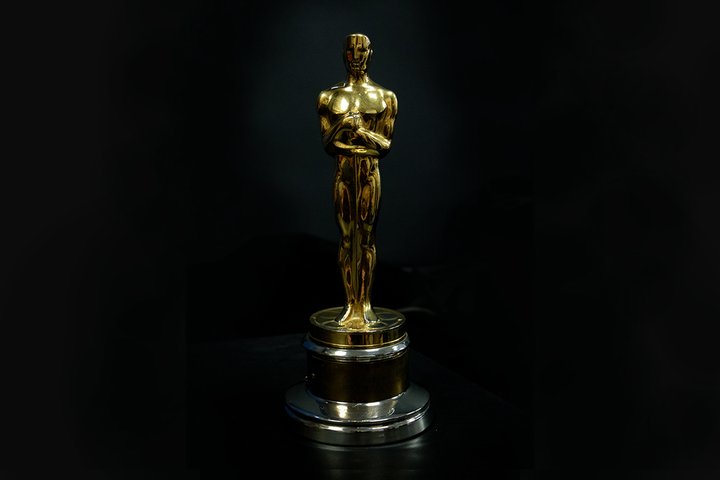
This is the script of Mike Leigh’s first film Meantime produced by Central Television for the newly launched Channel 4 starring up and coming young actors Tim Roth and Gary Oldman. Mike Leigh graduated as an Actor in 1962. A couple of years later he started to devise and direct his own plays. His brilliant and unique directing career spans film, theatre and television. He has been awarded at Cannes, Berlin and Venice Film Festivals, received three BAFTA Awards, and nominations for seven Academy Awards to name but a few of his accolades. He is one of Britain’s most critically acclaimed filmmakers.
Over twenty years later Leigh’s film Secrets & Lies starred RADA graduates Marianne Jean-Baptiste and Timothy Spall. It was nominated for countless awards including five Oscars and seven BAFTAS. Mike Leigh was on the Council at RADA for many years and can still be seen watching current students in their productions.
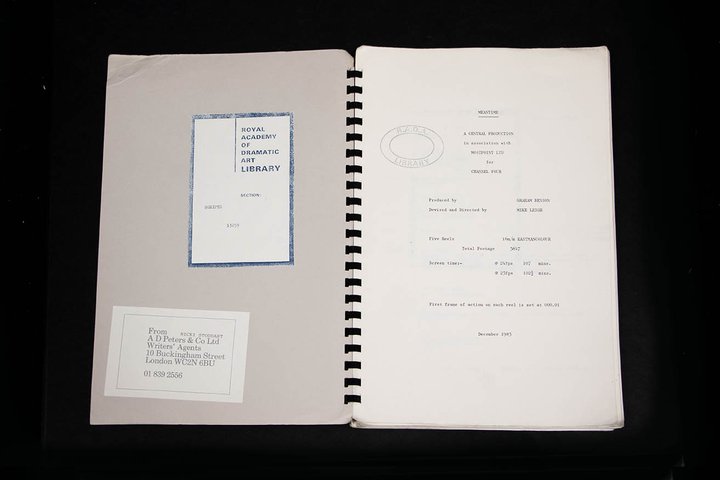
‘The thing I love about acting is that you can bring something very personal into the open and at the same time remain hidden because you're always playing a character in a story that someone else has imagined. You're always protected’. (Ben Whishaw)
Acting is about stepping into someone else’s shoes – being able to play a whole different set of circumstances from a whole different life. In order to play someone else you have to understand them from the ground up. During his training Ben Whishaw wore a pair of Brothel Creepers for a production of Jez Butterworth’s Mojo, a fast-paced gangster comedy set in Soho.
Whishaw is a unique and surprising actor, playing truth and pain with seeming ease and open heartedness. He has won Emmys, Baftas and a Golden Globe amongst many others. His wide-ranging roles to date include Q in the Bond films, Perfume, Paddington Bear, and Hamlet.
RADA has an amazing costume store – a collection of stuffed rails, boxes, cupboards, shelves crammed with every costume you could imagine. And there are so many shoes!
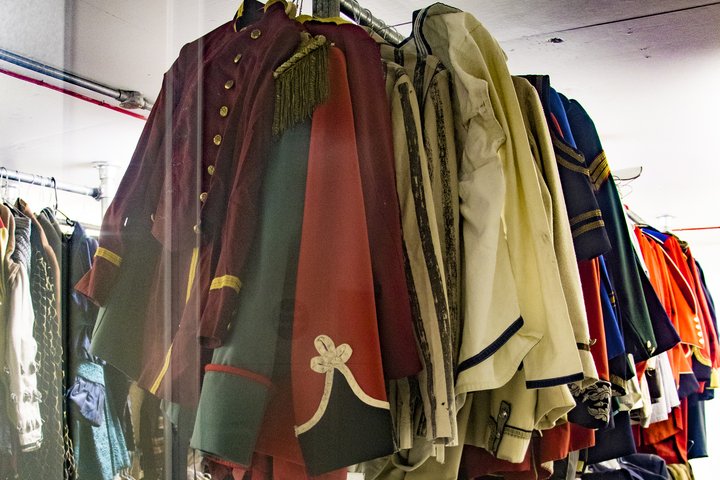
" If we don't get lost, we'll never find a new route." (Joan Littlewood)
Joan Littlewood won a scholarship to RADA in the 1930’s but did not like it and left. Littlewood was political and provocative, a woman ahead of her.
Instead, she and Jimmie Miller developed Theatre of Action, an ensemble company that became a hub for provocative playwriting, with hard-hitting stories about the working-classes. She was under constant scrutiny by the authorities - one play was seized for breach of the peace, and she was banned from the BBC for her alleged extreme communist views. MI5 observed her for almost two decades.
In 1945, Littlewood formed Theatre Workshop. The training focused on voice, movement and improvisation. Littlewood often placed physicality above the dialogue, a technique which influenced many of the great twentieth century playwrights.
Theatre Workshop found a permanent home in Stratford, East London and this is where Littlewood created Oh What A Lovely War! a musical satire of the injustices of the First World War. In 1969 that play was made into a film by fellow alumni Richard Attenborough, actor, director and producer, which she disliked very much.
RADA produced Oh What a Lovely War! in 2010. This decade of students includes James Norton, Cynthia Erivo, Amelia Jane Hankin, Aimee Lou Wood, Jai Morjaria, Phoebe Fox, Taron Egerton, Hiran Abeysekera, Susan Wokoma to name a few.
In recent times there have been seismic changes in the world. The demands for societal change, the violence of political extremes, the wars, pandemics and inequities have forced all of us to question who we are. The dramatic arts are how we do that – how we process the past, analyse the present and imagine the future. When covid stopped us being together, it is no surprise that television was our window to the outside world, to escape and to connect. We need stories. It is the answer to our busy, stressful and demanding lives.
This photograph is our latest cohort of graduates - actors, creatives, stage management, technicians, multi hyphenates in the making, directors (probably), writers (definitely), storytellers of all kinds. They are the future.
Storytelling is a talent, a challenge and a responsibility. It is hard work, indefinable, playful and impossible to explain. These graduates will translate who we are now through imagination, feeling and performance. So as RADA turns 120 years old, join me in saluting Herbert Beerbohm Tree who began it all, the men and women who challenged and changed the industry, who trailblazed new paths for us all, and the emerging artists who now hold the baton and are redefining the parameters of who should tell our stories.
